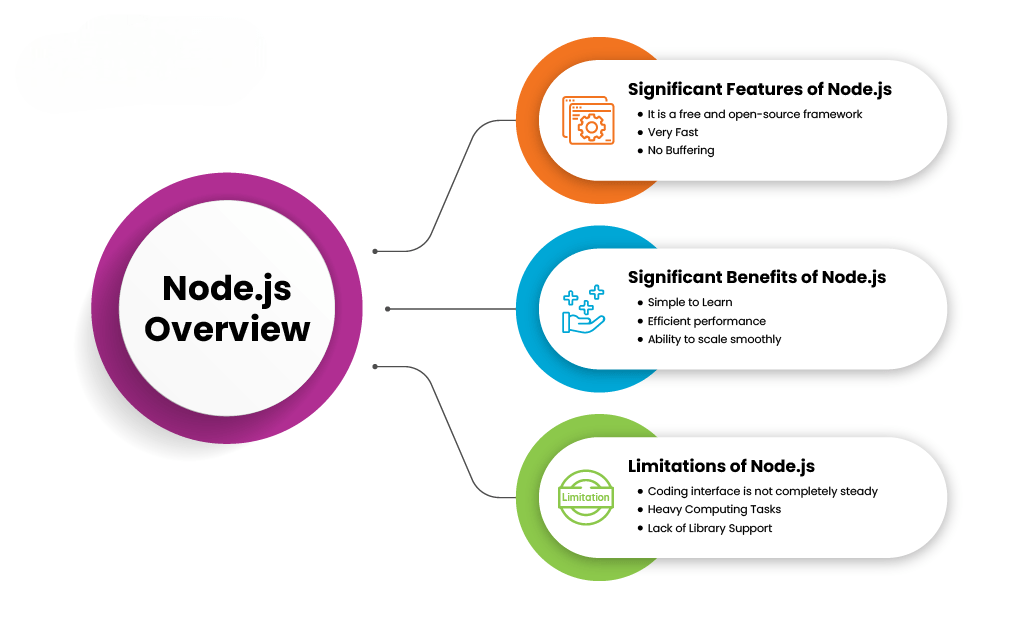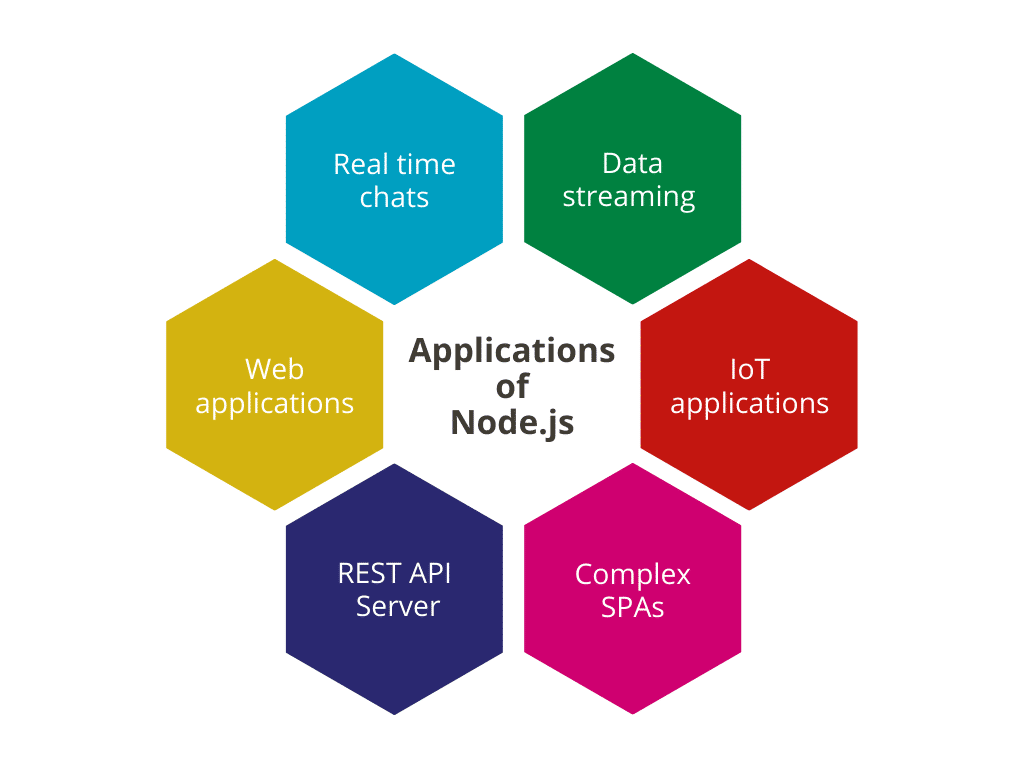
- Introduction to Node.js Frameworks
- Express.js: Key Framework for Node.js Development
- Koa.js: Lightweight Framework for Node.js
- NestJS: Scalable Framework for Enterprise Node.js
- Hapi.js: Reliable Server-Side Framework
- Sails.js: MVC Framework for Node.js Apps
- Meteor.js: Full-Stack Platform for Web & Mobile
- Total.js: Powerful Framework for Modern Web Dev
Introduction to Node.js Frameworks
Node.js frameworks provide developers with powerful tools and structures to build scalable, efficient, and high-performing web applications using JavaScript on the server side. As Node.js has grown in popularity due to its non-blocking, event-driven architecture, numerous frameworks have emerged to simplify development, enhance performance, and support various project requirements. Popular frameworks like Express.js, Koa.js, NestJS, Hapi.js, and Sails.js offer different levels of abstraction, flexibility, and built-in features, allowing developers to choose the one that best fits their application architecture and team preferences. To master these frameworks and become proficient in full-stack development, pursuing Web Developer Certification Courses can be a valuable step. These courses often cover the essential skills and concepts needed to effectively use these frameworks and build modern, scalable web applications. Express.js, for instance, is minimal and unopinionated, making it ideal for lightweight applications and custom setups, while NestJS follows a more structured and modular approach, inspired by Angular, suitable for large-scale enterprise applications. These frameworks streamline tasks such as routing, middleware integration, API handling, and database connectivity, significantly reducing boilerplate code and development time. With the right Node.js framework, developers can create anything from simple RESTful APIs to complex real-time applications like chat platforms or streaming services. Understanding the strengths and use cases of each framework helps developers make informed decisions that align with their project goals. In essence, Node.js frameworks are essential tools that empower modern JavaScript developers to build robust server-side applications with speed and scalability.
Are You Interested in Learning More About Web Developer Certification? Sign Up For Our Web Developer Certification Courses Today!
Express.js: Key Framework for Node.js Development
- Minimal and Unopinionated: Express.js offers a lightweight core, giving developers the freedom to structure their applications as they prefer without enforcing strict patterns.
- Powerful Routing System: It includes a robust routing mechanism that allows developers to define routes for handling different HTTP methods and URLs with ease. Additionally, learning How to Create Microservices in Node.js can further enhance your ability to design scalable and maintainable applications, leveraging the power of Node.js for distributed architectures.
- Middleware Support: Express.js uses middleware functions to handle requests, responses, and error management, enabling modular and reusable code.
Express.js is a fast, minimal, and flexible Node.js web application framework that simplifies the process of building server-side applications. It provides a robust set of features for handling HTTP requests, routing, middleware, and more, making it one of the most widely used tools for Node.js web development. Ideal for both beginners and experienced developers, Express.js serves as the backbone for many modern web and mobile applications.

- Seamless Integration with Databases: It supports easy integration with various databases like MongoDB, MySQL, and PostgreSQL, essential for dynamic Node.js web development.
- Efficient Error Handling: Built-in error-handling mechanisms allow developers to manage application errors effectively and ensure smoother user experiences.
- Large Ecosystem and Community: With extensive community support and a rich ecosystem of plugins, Express.js provides tools and resources to speed up development and solve common challenges.
- TypeScript by Default: NestJS is built with TypeScript, offering strong typing and modern JavaScript features that enhance productivity and reduce runtime errors.
- Modular Architecture: Applications are divided into modules, making it easy to organize code, reuse components, and scale development teams across large codebases. Understanding the Role of the DOM in React is crucial for effectively managing dynamic user interfaces and optimizing the performance of React applications.
- Dependency Injection: It provides a powerful dependency injection system, promoting better code manageability and enabling loosely coupled application components.
- Built-in Support for REST and GraphQL: NestJS simplifies the creation of RESTful APIs and GraphQL services, essential for modern Node.js programming.
- Extensive CLI Tooling: Its command-line interface (CLI) boosts developer efficiency by automating project scaffolding, generation, and testing.
- Integration with External Libraries: NestJS integrates seamlessly with popular libraries like TypeORM, Mongoose, and Passport.js, allowing rapid development of robust and secure applications.
- MVC Architecture: Sails.js follows the MVC design pattern, making it easy to organize application logic and maintain clean, structured code.
- Auto-Generated REST APIs: It can automatically create RESTful endpoints for your data models, significantly speeding up API development.
- Built-in WebSocket Support: Sails.js comes with integrated support for WebSockets, enabling real-time features like chat, notifications, and live updates without extra configuration. Additionally, learning Build React Forms Step-by-Step can help you understand how to manage user input and handle state effectively within React applications, complementing real-time features like those in Sails.js.
- Database Agnostic via Waterline ORM: With Waterline, Sails.js provides a unified interface for working with different databases, including MongoDB, MySQL, PostgreSQL, and more.
- Scalable for Large Applications: Its modular and service-oriented structure makes it a solid choice for building scalable enterprise-level applications.
- Rich Ecosystem and Community: Sails.js has a mature ecosystem and active community, offering plugins, tools, and support to enhance Node.js web development projects.
Koa.js: Lightweight Framework for Node.js
Koa.js is a modern, lightweight web framework designed by the creators of Express.js to offer a more refined and modular approach to building web applications. Built specifically for Node.js programming, Koa leverages ES6 features such as async/await to eliminate callback hell and improve error handling, resulting in cleaner and more maintainable code. Unlike Express, Koa does not come with built-in middleware, giving developers full control over how features like routing, request parsing, and authentication are handled. This minimalistic design makes Koa highly customizable and ideal for developers who want to build applications from the ground up without unnecessary bloat. Its modular architecture promotes the use of small, focused middleware functions, leading to better application performance and scalability. Understanding What Is Backend Development Overview can help you grasp how frameworks like this one manage server-side logic, databases, and APIs to build powerful, scalable applications. Koa is particularly well-suited for developers who prefer a lightweight core and need more flexibility to tailor their web servers exactly to their project requirements. As a next-generation framework for Node.js programming, Koa enables precise control over request and response handling, making it a powerful tool for building APIs and modern web applications. Whether you’re creating a small service or a large-scale application, Koa offers the speed, simplicity, and power needed for efficient backend development.
Excited to Obtaining Your web developer Certificate? View The web developer course Offered By ACTE Right Now!
NestJS: Scalable Framework for Enterprise Node.js
NestJS is a progressive Node.js framework that enables developers to build efficient, reliable, and scalable server-side applications. Built with TypeScript and heavily inspired by Angular’s architecture, NestJS brings structure and modularity to Node.js programming, making it an excellent choice for large-scale enterprise projects. It combines elements of object-oriented programming (OOP), functional programming (FP), and functional reactive programming (FRP) to create a well-organized and maintainable codebase.
Interested in Pursuing web developer certification Program? Enroll For Web developer course Today!
Hapi.js: Reliable Server-Side Framework
Hapi.js is a powerful and feature-rich framework for building scalable and secure applications in Node.js. Designed with configuration-driven development in mind, Hapi.js offers a robust set of built-in features that make it ideal for developing enterprise-grade applications and RESTful APIs. Unlike some minimalist frameworks, Hapi.js emphasizes maintainability, reusability, and rich plugin support, allowing developers to build applications with minimal external dependencies. To gain expertise in using Hapi.js and other frameworks effectively, enrolling in Web Developer Certification Courses can help you master the essential skills and best practices for building robust, scalable web applications. Its powerful routing system, fine-grained request validation, integrated authentication, and caching capabilities make it a solid choice for applications where performance and security are top priorities. Hapi.js is known for its excellent support for input validation through the Joi library, which enables developers to define clear and robust validation rules directly within the application. Additionally, its plugin-based architecture promotes clean separation of concerns and modular code organization, making complex applications easier to scale and maintain. Hapi.js also includes built-in support for features like logging, monitoring, and error handling, reducing the need for third-party solutions. With a strong focus on configuration over convention, Hapi.js appeals to developers who want full control over the behavior of their server. Overall, Hapi.js is a dependable and mature framework that supports professional-grade Node.js programming and enterprise application development.

Sails.js: MVC Framework for Node.js Apps
Sails.js is a full-featured MVC (Model-View-Controller) web application framework for Node.js, designed to mimic the familiar patterns of frameworks like Ruby on Rails while taking advantage of the asynchronous, non-blocking nature of Node.js. It is especially well-suited for building data-driven APIs, real-time applications, and service-oriented architectures. Sails.js simplifies backend development by offering powerful conventions, auto-generated REST APIs, and seamless integration with WebSockets.
Meteor.js: Full-Stack Platform for Web & Mobile
Meteor.js is an open-source, full-stack JavaScript platform that enables developers to build modern web and mobile applications quickly and efficiently. Built on top of Node.js, Meteor simplifies the development process by allowing developers to use a single language JavaScript across both the client and server sides. One of Meteor’s standout features is its real-time data synchronization, which automatically updates the user interface whenever the underlying data changes, without requiring complex configurations or additional code. This makes it especially suitable for applications like chat apps, collaborative tools, and live dashboards. Meteor integrates seamlessly with MongoDB and uses a powerful data layer called Distributed Data Protocol (DDP) to handle live data updates. For those looking to expand their web development skills, a Python Web Development Tutorial for Beginners can provide a solid foundation in building server-side applications, which complements the real-time capabilities offered by Meteor. It also includes a rich set of built-in tools for packaging, dependency management, and deployment, reducing the need for third-party configurations. Developers can extend Meteor with packages from its own ecosystem or from NPM, offering great flexibility. Additionally, it supports integration with popular front-end frameworks like React, Angular, and Blaze. With its streamlined development process and real-time capabilities, Meteor.js is an excellent choice for rapid prototyping and production-ready apps, making it a strong asset in the Node.js programming landscape.
Total.js: Powerful Framework for Modern Web Dev
Total.js is a modern, full-stack JavaScript framework designed to simplify and streamline the process of developing web applications. It is built on Node.js and supports both server-side and client-side code, making it an ideal solution for creating dynamic and scalable applications. Total.js stands out due to its modular structure, which allows developers to quickly integrate and use various features like routing, real-time communication, and data handling. It comes with built-in support for RESTful APIs, WebSockets, and database management, offering a comprehensive platform for building everything from small websites to complex enterprise solutions. Pursuing Web Designing Training can complement your skills, helping you create visually appealing and user-friendly websites alongside backend frameworks. With its intuitive syntax and built-in tools, Total.js accelerates development while maintaining flexibility, enabling developers to focus on business logic instead of reinventing common features. The framework is also highly performant, leveraging the power of Node.js for non-blocking, event-driven architecture, which ensures quick response times even under heavy loads. Total.js is designed to be lightweight and easy to learn, making it suitable for both experienced developers and those new to backend development with JavaScript. Whether you’re building a simple web app or a large-scale enterprise system, Total.js provides the necessary tools and infrastructure to bring your project to life efficiently.

